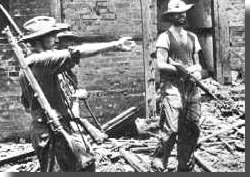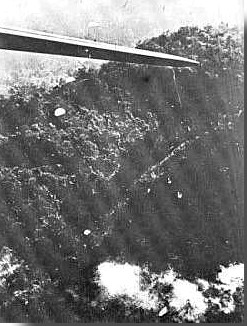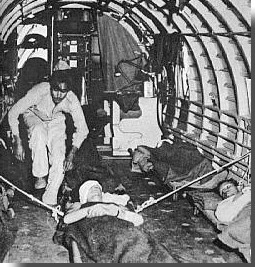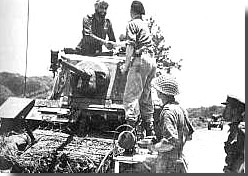A C h i n d i t A n g u i s h
P o s t s c r i p t
P o s t s c r i p t
P o s t s c r i p t
The Fateful Change
photo caption
Calvert with some of his officers inside Mogaung after the battle to seize it. Officer on right is Major James Lumley, father of British actress Joanna Lumley. Of the 4 Victoria Crosses won by Chindits, 3 were awarded posthumously.
Photograph courtesy of
the Imperial War
Museum, London


The Chindits had faith in Wingate to use them properly in battle and to lead them to success. They trusted him to get the best material to them in preparing for the campaign and to get the best support in order to accomplish their missions. In creating the force however, Wingate had neither convinced enough important officers of its potential nor did he overcome the personal antagonism he fueled. Once the news of Wingateís death was radioed the next day, the feeling among his troops was mostly disbelief. At White City once the news of Wingateís death came through Brigadier Calvertís reaction was, "Oh, who will look after us now?"1
Momentous changes were in store for the Chindits. General Slim asked Tulloch for his opinion for the new force commander. Brigadier Lentaigne, in command of 111th Brigade, was who he recommended. In recommending him Tulloch was not aware of the mental and physical troubles he was experiencing under the strain of command. Nor was he aware that Lentaigne regarded neither Wingate nor his ideas with respect, and was pessimistic about the survival of the Chindits. Slim appointed Lentaigne to command, believing he was an orthodox officer and a solid choice from his old regiment and, "Because he was the only one who wasnít mad. And I knew with him in command there wouldn't be any nonsense about writing direct to Churchill and Mountbatten."2 Slim still desired to help out Stilwell but was concerned about the Japanese offense. So he initially wanted to keep the existing units in place to keep the stranglehold on the lifeline to the north while having the reserve Chindit brigades move towards the Chindwin and cut the Japanese supply lines. But on April 9th Slim changed the plan & Mountbatten agreed. The Japanese no longer appeared to have the advantage in fighting against Slimís army around Imphal and Kohima, and he wanted the Chindits to come under the command that was directly supposed to benefit from them. The decision was made that the Chindits were to be transferred to the command of Stilwell to directly aid his stalled advance on Myitkyina, the crucial town on the planned roadway to China.
Under Stilwell, Lentaigne devised a plan for the employment of the Chindits. Stilwell's Chinese forces were unwilling to accomplish their mission, and so he needed to find another force. He thought he could find reliable troops in the Chindits and Merrill's Marauders. Calvert would abandon White City and Broadway and head north to the town of Mogaung which lay just southwest of Myitkyina along the planned road. Morris Force would move westward to assist. The 111th would create a new block along the railway further north of White City and remain static, and the other two brigades would move to assist it. With the fighting in India demanding more of the needed air transport, Fergussonís 16th Brigade was to be flown out. Both Calvert and Fergusson greatly disagreed, for they opposed giving up what they had fought for & abandoning future possibilities. Fergusson wanted to have another shot at Indaw for its airfield, and Calvert wanted the reserve Chindits flown in to White City to allow him to march north and attack the Japanese facing Stilwell in the rear. Changing the mission from indirectly helping Stilwell and ignoring the potential against the Japanese on the Imphal front, to a mission of directly supporting Stilwell would turn out to be a missed opportunity. The Japanese Burma Army Chief-of-Staff after the war agreed for at the time, "Operations continued according to plan but these airborne forces proved to be a devastating factor in cutting lines of communications...and contributed materially to the Japanese failure in the Imphal and Hukawng [northern Burma] operations."5 Another Japanese report put it, "The fact that Major-General Wingate, with a force close to one and a half divisions, operated for three months in the rear of 15th Army in a situation of strategic predominance and carried out operations which were clumsy and inept in relations to military force, was a stroke of good luck in the midst of disaster for the Japanese Army."6
photo caption
Supply drop in difficult terrain. During the siege of White City it was impossible to remove the Japanese corpses in the minefields and on the barb wire. The pilots of the light planes flying in claimed not to need to navigate in during their final approach, the smell of the bodies indicated the position location.
Photograph courtesy of
the Imperial War
Museum, London
To the Bitter End
 Under Stilwell the Chindits became regular infantry, but without the supporting artillery, engineers and logistics. They were assigned the mission of holding and taking fixed positions indefinitely instead of remaining mobile & without being trained for such a task. The Air Commando was broken up and the force would have to compete for air support with every other unit. In late April Lentaigne appealed to Mountbatten that Churchill be informed, but was immediately rebuffed. Afterward he retreated into lethargy and never visited the battlefields or his men. In April before the move north, 77th Brigade reinforced by the West African unit fought several large battles to defeat Japanese attempts to take White City. After its abandonment, interruption of supplies to the Japanese 18th Division was only intermittent and the 53rd Division followed the Chindits north. Before itís withdraw at the end of April 16th Brigade operated around Indaw, as did 14th Brigade, successful in actions against enemy supply columns.
Under Stilwell the Chindits became regular infantry, but without the supporting artillery, engineers and logistics. They were assigned the mission of holding and taking fixed positions indefinitely instead of remaining mobile & without being trained for such a task. The Air Commando was broken up and the force would have to compete for air support with every other unit. In late April Lentaigne appealed to Mountbatten that Churchill be informed, but was immediately rebuffed. Afterward he retreated into lethargy and never visited the battlefields or his men. In April before the move north, 77th Brigade reinforced by the West African unit fought several large battles to defeat Japanese attempts to take White City. After its abandonment, interruption of supplies to the Japanese 18th Division was only intermittent and the 53rd Division followed the Chindits north. Before itís withdraw at the end of April 16th Brigade operated around Indaw, as did 14th Brigade, successful in actions against enemy supply columns.
photo caption
Chindit casualty evacuation by air. Over 75% of the Chindit casualties came after Wingate's death. 1,507 men were killed or listed missing, 2,531 were wounded in action, and another 5,000 were evacuated due to illness or sickness.16
US Air Force photo
The 111th Brigade established its block further north up the railway valley in May. But it was poorly sited allowing the Japanese 53 Division to close in with artillery and anti-aircraft guns to set siege. And the Monsoon rains disrupted air supply, turning foxholes into pools & causing corpses to bloat. This prevented the ability of the other brigades to come to its assistance as the flooded terrain and mud slowed movements, forcing the 111th to fight alone. After heavy casualties and with positions crumbling the stronghold was abandoned at the end of May, the seriously wounded who could not be moved put out of their misery. At Mogaung in early June Calvert's men faced a Japanese force of equal strength, dug-in and supported by artillery. Officer and NCO casualties were extremely heavy in the attacks against defended positions. The Chindits suffered under the constant Japanese shelling, and from malaria and trench foot. Air support tried to compensate for their lack of heavy firepower, and continued to be placed within yards of friendly positions. The fighting power of the Chindits, and that of the USAAF and RAF pilots, deteriorated from exhaustion in daily combat against the Japanese and from diseases that could not be properly treated. Through ferocious fighting and dogged determination, by the end of June the town was taken. Morris Force was also sent to a more conventional war, near Myitkyina. There amid flooded fields and diminishing strength, losses were heavy.
 The fighting continued against the remaining Japanese positions in the railroad valley and around Mogaung through June and July. In spite of men loosing dozens of pounds in weight and suffering from multiple malarial attacks, as well as from medical statements that officers and men were worn out, the Chindit brigades were ordered to fight on. The enemy also was exhausted & sick, and without supplies, but still had to be driven from defended positions. With success at Myitkyina in August, Stilwell finally
relented to the relief
of the Chindits. The last Chindit columns were flown back to India almost five months after the start of the mission, the men exhausted and sick physically and mentally. A July medical exam showed the 111th brigade with only 118 men fit for service.9 The strength to the 77th was reduced from a starting strength of 2,300 for Mogaung to only 300 sick & tired men fit for action.10 Morris Force was also decimated, casualties and disease having reduced its strength from over a battalion to that of a mere platoon. Malaria accounted for most of the sick evacuated. It is estimated that the Chindits inflicted some 4,700 dead alone on their opponents.11 The rest of Northern Burma was reoccupied in late 1944 by American, Chinese and British forces.
The fighting continued against the remaining Japanese positions in the railroad valley and around Mogaung through June and July. In spite of men loosing dozens of pounds in weight and suffering from multiple malarial attacks, as well as from medical statements that officers and men were worn out, the Chindit brigades were ordered to fight on. The enemy also was exhausted & sick, and without supplies, but still had to be driven from defended positions. With success at Myitkyina in August, Stilwell finally
relented to the relief
of the Chindits. The last Chindit columns were flown back to India almost five months after the start of the mission, the men exhausted and sick physically and mentally. A July medical exam showed the 111th brigade with only 118 men fit for service.9 The strength to the 77th was reduced from a starting strength of 2,300 for Mogaung to only 300 sick & tired men fit for action.10 Morris Force was also decimated, casualties and disease having reduced its strength from over a battalion to that of a mere platoon. Malaria accounted for most of the sick evacuated. It is estimated that the Chindits inflicted some 4,700 dead alone on their opponents.11 The rest of Northern Burma was reoccupied in late 1944 by American, Chinese and British forces.
photo caption
Linking up after breaking the siege at Imphal. As for the Japanese, "The tatterdemalion divisions staggered back along the mountain roads. Weapons gone, clutching a stick in one hand and a rice tin in the other the Japanese stumbled painfully through the torrential rain."17
Photograph courtesy of
the Imperial War
Museum, London
The Indirect Success
After hard and brutal fighting at Imphal and Kohima, the British and Indian troops of the 14th Army led by Slim halted and soundly defeated the Japanese. Casualties on both sides were severe as the heavy fighting lasted several months. Mutaguchiís belief that success as in 1942 could be repeated with the aid of the Samurai spirit, and that he could pursue his ambitious strategy of taking Dimaphur, did not transpire. This British army was a more solid and better led army. Underestimating his foe, Mutaguchi sent his men against a better supplied and organized foe. Allied air transport was critical in the British victory for moving reinforcements and bringing in supplies. By delaying the cancellation of his operation, the coming of the Monsoon rains in May meant Mutaguchi's dangerous logistic gamble and his army's poor staff work spelled disaster. By the time retreat was authorized in July, "His entire army was a rabble. It was beaten, half-starved, and thoroughly demoralized; it lacked all power to attack, and very little to defend."12 Shortages of food & medicine inflicted more suffering and pushed the retreating survivors into a war for survival. Nearly three-fourths of the original invading force, nearly 60,000 men, became casualties in battle or from disease.13 It was the largest land defeat for the Japanese army up to that time in the war.

 The Japanese forces in northern Burma were greatly weakened in their ability to fight by the Chindit actions. With their lines of communication cut & supply dumps destroyed, most of the supplies & reinforcements for the Japanese 18th Division were denied. At Imphal, the presence of air transport squadrons for bringing in supplies and reinforcements (and the moving of units across the theater) was due to Wingate's request back in March for such units and his proven use of them. The Chindits with air support interfered with supplies trying to move forward into India across the two most northern supply routes. And so two of the three Japanese divisions fighting in India did not receive additional supplies past their initial 20-day allotment. The Chindits had drawn off most of the Japanese reserves and supplies which could have been used to win the closely fought key battles at Kohima and Imphal. And their activities also had a negative psychological impact upon their commanders & delayed command decisions. But the third supply line to the Japanese fighting in India, the southern one and most crucial one, was never severed or interfered with. And the surviving Japanese from India were allowed to retreat & rebuild without hindrance by the lack of the Chindit forces arrayed against their lines of communications. The Chindits were strategically mis-used.
The Japanese forces in northern Burma were greatly weakened in their ability to fight by the Chindit actions. With their lines of communication cut & supply dumps destroyed, most of the supplies & reinforcements for the Japanese 18th Division were denied. At Imphal, the presence of air transport squadrons for bringing in supplies and reinforcements (and the moving of units across the theater) was due to Wingate's request back in March for such units and his proven use of them. The Chindits with air support interfered with supplies trying to move forward into India across the two most northern supply routes. And so two of the three Japanese divisions fighting in India did not receive additional supplies past their initial 20-day allotment. The Chindits had drawn off most of the Japanese reserves and supplies which could have been used to win the closely fought key battles at Kohima and Imphal. And their activities also had a negative psychological impact upon their commanders & delayed command decisions. But the third supply line to the Japanese fighting in India, the southern one and most crucial one, was never severed or interfered with. And the surviving Japanese from India were allowed to retreat & rebuild without hindrance by the lack of the Chindit forces arrayed against their lines of communications. The Chindits were strategically mis-used.
With the road to China completed in January of 1945 the first convoys journeyed from Ledo, India to China. But the war was being decided on another front by then, and Chinese manpower and airbases were no longer necessary. The opening up of the ground supply route to China did not improve either the willingness or ability of the Nationalist Chinese to fight, nor to eventually avoid self-destruction. Refreshed with new troops and with morale high again, the Chindits were informed that there was no need for them and they were disbanded. In early 1945 the British forced a crossing of the Irrawaddy, and after initial heavy fighting the shattered Japanese gave way. Advancing rapidly with the aid of air power, in May Rangoon was taken. Preparations for an amphibious assault against Malaya then began. But in August the war came to an end, and the remnants of the Japanese army in Burma surrendered. After the war Burma achieved its independence.
Before the House of Commons in August of 1944, Winston Churchill remembered Orde Wingate the man and as an instigator of mobile warfare, "We placed our hopes at Quebec in the new Supreme Commander Admiral Mountbatten and in his brilliant lieutenant Major-General Wingate who, alas, has paid a soldiers debt. There was a man of genius who might well have become also a man of destiny. He has gone, but his spirit lives on in the long range penetration groups, and has underlain all these intricate and daring air operations and military operations based on air transport and on air supply."15
1. Shelford Bidwell, The Chindit War (New York: MacMillan Publishing, 1979), 158.
2. Bidwell, 162.
3. Field Marshall Viscount Slim, Defeat Into Victory (London: Cassells, 1956), 268.
4. Derek Tulloch, Wingate In War And Peace (London: History Book Club, 1972), 234.
5. Michael Calvert, Prisoner of Hope
(London: Jonathan Cape, 1952), 289.
6. Sir Robert Thompson, Make For The Hills (London: Leo Cooper, 1989), 54.
7. Bernard Fergusson, The Wild Green Earth (London: Collins Publishing, 1946), 123.
8. Tulloch,234.
9. Louis Allen, Burma, The Longest War (New York: St. Martin's Press, 1984), 378.
10. Calvert, 245
11. Peter Mead, Orde Wingate And The Historians (Devon: Merlin Books, 1987), 74.
12. Arthur Swinson, Four Samurai (London: Hutchinson, 1968), 147.
13. Allen, 638.
14. Mead, 152-3.
15. Christopher Sykes, Orde Wingate
(New York: World Publishing Company, 1959), 545.
16. Bidwell, 297.
17. Allen, 313.

